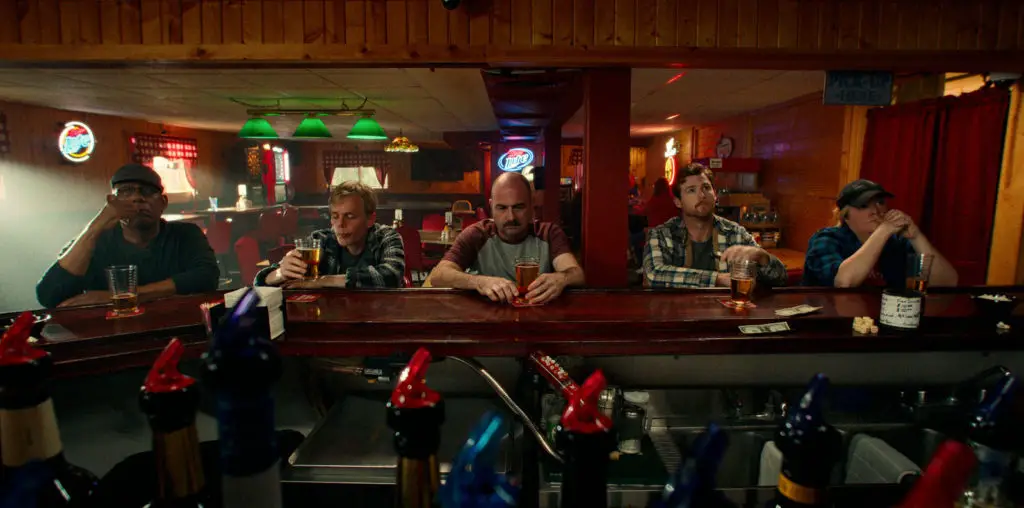
One of the most challenging styles of movies to pull off are films that center on people talking, discussing, and having conversations. The success rate is relatively low because film is a visual medium. Dialogue is only a small part of film as an art form. You’ve got to bring a lot to the table to ask an audience to passively sit and watch people talk, and not allowed them to join the discussion.
I state this upfront because, from the very beginning of writer/director Serge Kushnier’s film, The Idea of Manhood, I could see that Kushnier had a huge challenge laid out before him. Is this the film that will buck the trend? I sure hope so, because the odds are very low.
The Idea of Manhood opens with a late night meeting between two old friends as Sandy (Karl Bury) shows up unannounced at the doorstep of college friend, Jacob (Jeremy Kushnier). Jacob is home alone as his wife and children are away at modeling camp. Sandy is on an early stop of his solo cross-country road trip.
“Jacob is home alone as his wife and children are away at modeling camp. Sandy is on an early stop of his solo cross-country road trip.”
This little setup leads into a series of conversations starting with the reason behind Sandy’s road trip. As the two are on a leisurely stroll in the city, Sandy’s decided to live the loner life, and today, he has embraced the fact that he is “done with people.” He easily becomes annoyed with those around him. And this is particularly true with the women Sandy dates.
On the way back to the house, the two walk past a local bar that Jacob frequents. Jacob sees Molly (Elizabeth Masucci), his regular server. Sandy jokes about how he met Jacob on the set of a gay porno he directed. Soon Molly reconfirms that dinner is still on at Jacob’s place with along with her friends. So why would Jacob throw a party at his pad with the attractive Molly and her young friends, while his wife and kids are away?
Of course, this leads to conversations at the party, conversations after the party, and an in-depth conversation with between Sandy and Jacob where they unload some deep s**t. I may sound like I’m down on talking movies and I’m not. It takes a skilled screenwriter to pull it off and not all screenwriters are there yet.
“…found Jacob’s family issues predictable, but how Sandy dealt with it was surprising.”
My feeling after seeing The Idea of Manhood was that the conversation was interesting and built to a logical revelation at the end. But what I found myself needing to do was put in some work to follow the conversation and where it was going. In other words, it was up to me to hang with the conversation, so I don’t miss anything important. Ideally, filmmakers should not expect the audience to work so hard.
The story’s opening dialogue should instantly engage the audience, making a connection with them, and then draw them into the heart of your story. In this instance, basic plot facts about the characters are offered in the opening dialogue (Jacob’s family is at modeling camp or Sandy’s on a road trip) and then right into a discussion of the nature of relationships. If an audience can’t strongly connect with the opening discussion, then you run the risk of losing them from the start. Admittedly, whether Kushnier succeeded in capturing my attention is subjective on my part and you may find it personally engaging.
Moving on to the rest of the film, I found Jacob’s family issues predictable, but how Sandy dealt with it was surprising. The dinner party was also fun, featuring an incredibly stupid millennial. And Sandy’s story takes a good emotional turn. The greatest weakness of The Idea of Manhood is the opening moments between the two leads. Most people will probably watch this at home on video or some streaming platform, and I’m just not convinced the first ten minutes of the film is engaging enough to keep its audience tuned in to the end. The Idea of Manhood comes through with a recommendation. Just be a little patient at the start.

The Idea of Manhood (2019) Written and directed by Serge Kushnier. Starring Karl Bury, Jeremy Kushnier, Elizabeth Masucci.
6.5 out of 10 stars

